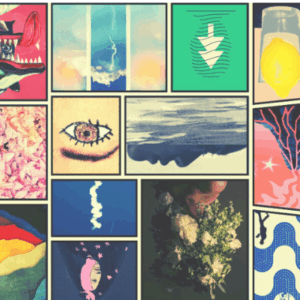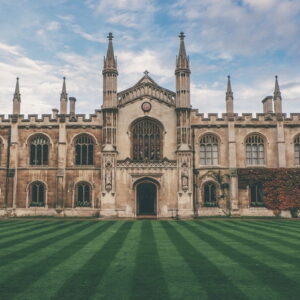
A New Generation of Writers in Bosnia and Herzegovina Narrates Life
Beyond War
Stacy Mattingly on the Country's Renewed Literary World
A cool, gray afternoon in May 2019. On a shady street just west of the Neretva River, Mirza Purić and I and a couple of others walk in the direction of a Mostar cultural center we’ve decided to visit. The building houses a café, radio station, and space to perform, all run by young artists. Abrašević, or Abraš, people in Mostar call it—short for OKC Abrašević, named after a 19th-century poet who died before he turned twenty.
Coronavirus, separation, and indoor life are more than half a year away. The river, now out of sight, courses turquoise, even under a cloudy sky. We walk and make jokes. Mirza sports his rock star fashion—cap, sunglasses, canvas jacket, sneakers. He’s slimmer than the last time we were together—in Boston last year when he came for a series of readings and events. Now he regularly checks his Fitbit. “I’ve lost four stone,” he remarks at some point or another, using the British term. Mirza, who is a literary translator, carries a British accent like few non-Brits. His English is flawless, wide-ranging, and sophisticated. And that’s before you read his English translations.
Our guide for the day is Mostar poet Anita Pajević, whom I’ve known as an acquaintance for years but only online. Mirza has translated a lot of her work, including her prizewinning debut collection, though the book hasn’t yet been published in English. A tall, slim redhead in a long skirt and sneakers, Anita radiates sweetness—whenever I compliment her, she turns it around and compliments me. As we stroll, she tells us about Mostar’s civic life and its post-war segregated school system.
I’ve already heard much about the persistent and fierce political divide between the city’s two main groups, Muslim and Catholic. But we won’t find those politics at Abrašević, Anita insists. The younger generation and the artists don’t want anything to do with it.
Nationalist politics here are not unique to Mostar—we are in Bosnia and Herzegovina, still roiled by ethnic divisions and where nationalist aspirations continue to rise, indeed are now surging, more than twenty years after the 90s war. That conflict, which overwhelmed the former Yugoslavia, led to horrors not seen in Europe since World War II. Most everyone I know in this country suffered trauma and enormous loss; many friends struggle with PTSD. Sarajevo, the capital, survived an almost four-year siege marked by endless shelling and sniper fire, freezing winters, and hunger. Many thousands died. Mostar, too, endured a siege as well as internal fighting that devastated the city, leaving it physically and psychologically divided. In that postwar environment, young Mostar artists and peace activists set out to reclaim a place for art, culture, and expression, and in the 2000s, some secured permission to use a ruined building as a hub, eventually becoming its owners. The building is now Abrašević.
Continuing along the tree-lined street, our group meets a young guy headed in the other direction. He stops abruptly, exclaims, and grabs Mirza. Hugs, more exclamations. Hej! Šta ima? Mirza turns to us and says, “It’s another one!” He means another friend, but the rest of us, in a mood for joking, have taken to calling them fans. We encountered our first on the pedestrian mall earlier in the day as we popped into shops for bread and almonds. Mirza is, in fact, a rock musician—the bass player in the noise-rock duo Gudron, which has toured in the Balkans many times over—meaning he’s a little renowned, or, he would say, simply recognizable, in certain circles.
My friends in Bosnia and Herzegovina work in a difficult environment, one that puts a great deal of pressure on personal life, and I’ve learned another kind of artistic commitment from them.
It turns out he’s played at Abrašević.
“Why don’t we do something there?” I ask him as we walk. By do something I mean hold writing workshops, readings, public conversations—what Mirza and I have talked for years about planning with people we know in Mostar, the same kind of work we’ve done with writer friends in Sarajevo. Partly for the joy of creating art with others. Partly to generate a kind of collective artistic energy and network. To open up space for voices that very much need to be heard—including linguistic space, or spaces, as Mirza translates between English and Bosnian/Croatian/Serbian in both directions.
I realize I’m bouncing as I speak with him about this. It isn’t the coffee, though I’ve had quite a lot of caffeine. What I’m experiencing is bliss. I’m back in Bosnia and Herzegovina after a long while. My then-boyfriend is with me. Anita, whom I’ve wanted to meet in person, is, too. And Mirza, who is like my brother.
Love—that’s the way I know to describe it.
Not that I lack for community or collaborative opportunities in Boston, where I live, write, and teach—far from it. But my friends in Bosnia and Herzegovina work in a difficult environment, one that puts a great deal of pressure on personal life, and I’ve learned another kind of artistic commitment from them.
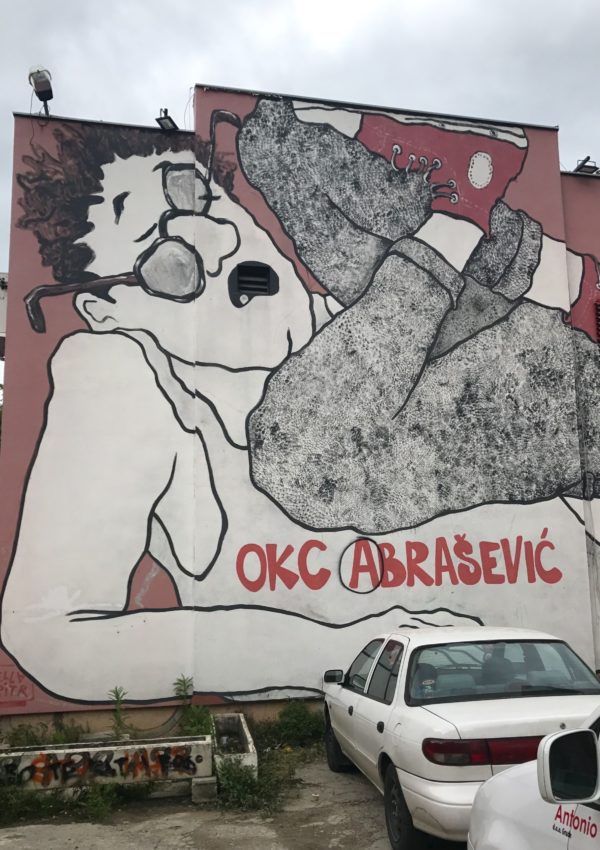
We arrive at Abrašević, greeted by a massive red-black-and-white mural, a depiction of a guy in a tank top and sneakers, spectacles off kilter, body a-tangle, his feet higher than his head, as if he’s trying to push out of the box that is the border of the building. The mural will be gone soon—Mostar is known for its street-art scene, and this wall changes, I later learn, with a particular festival’s agenda. When we enter the café space, dim and empty on a weekday afternoon, another young man approaches us and, seeing Mirza, follows the same routine—he stops, exclaims, hugs.
“Number three,” Mirza tells us with a wink, introducing us to his friend. He and this bloke, he says, did a radio interview together on Abrašević’s station after a Gudron gig.
“If we do something here,” Mirza says to me, “we could promote the event through the station. These guys are brilliant.”
*
Arriving in Mostar, you instantly notice the city’s dividing line. The blue-green Neretva River runs through the center, mosques on one side, Catholic churches on the other. Mostar’s iconic Stari Most spans the Neretva, the Old Bridge a reconstruction of the original, which was built by the Ottomans in the 16th century and destroyed during the 90s war. “A river,” reflects the narrator of Serbian novelist David Albahari’s Snow Man, “… has always, regardless of all the dams, embankments and bridges, done nothing but divide….”
The road from mountainous Sarajevo down to Mostar in the southern region of Herzegovina is a well-traveled route that takes you eventually to the Croatian border. Mostar is about an hour or so from the Adriatic coast. Mirza, my boyfriend, and I rented a car—the drive from Sarajevo was magnificent, even under clouds. We descended into Konjic, where I picked up a coffee-to-go, my second or third kafa s mlijekom of the day, and passed the lamb restaurants of Jablanica along a high ridge before coming down to Jablanica Jezero, a gorgeous, eye-blue lake, then speeding through tunnels cut into the mountains, the Neretva running alongside us with its pulse and allure, that blue color, the river like a companion, almost level with the road, itself another road, glittering there with its promise.
At Jablanica, we stopped for lamb shanks at Mirza’s insistence. “The shanks,” he kept saying with relish, playing the host. Afterward, we pulled over at a café for another kafa s mlijekom and a view of the lake; we climbed a slippery staircase in the rain to photograph water, mountains, and mist. I felt exhilaration and disbelief: I was here again with my body. I’d been living in these spaces in my imagination since I’d been away—working on a novel set in this country. I’d also launched a writers’ collective in Sarajevo in 2012, the Sarajevo Writers’ Workshop, and I stayed in regular touch with those friends, sharing writing and looking for publishing opportunities for our work.
I’d made my first trip to the Balkans in 2011 to research the novel, staying for some time with a Croatian friend in her Sarajevo apartment. Are you writing about the war? people would ask me. When I said no, they would express approval or relief. A year later I returned to the city to continue working on the book. I also hoped to start a workshop for young writers. An American poet had formed a spoken word group the previous year and moved away; some of the writers wanted to continue, and through friends, I thought we could gather others. My impulse at the time was a desire to co-create community. To see what we, a bilingual group of writers, could make, exchange, and learn from each other. I knew that through the friction of close relationships important art and insight could emerge. I’d taught creative writing at Boston University, where I earned an MFA in fiction. But I didn’t want to impose myself or an American approach to writing, so I sought advice from poet Ferida Duraković, then the executive director of PEN Bosnia and Herzegovina. Her support for the workshop idea gave me a sense of freedom to proceed. When the group started up that fall, we met at Buybook bookstore & café, went for drinks across the street at Galerija B. Smoje, and gave readings in the city.
Mirza served as our literary translator from the beginning.
*
After arriving in Mostar, the three of us walked around Old Town, crossing and re-crossing Stari Most, where, on clearer days, divers ready themselves to go sailing off and plunge into the Neretva. In the evening, we pulled up in front of a westside restaurant in a downpour and joined our friend Senka Marić for salad, pizza, and what she called schnapps, otherwise known as rakija. This was one of her favorite places to eat, she told us, and once we sat down, she walked us through the menu and consulted with the waiter, extending a familiar hospitality—witness Mirza, the twenty-five coffees, and the lamb shanks. We were now Senka’s guests.
A poet, novelist, and journal editor, Senka is in her forties, as am I. Both of her cheeks are dimpled, which you notice immediately, because she smiles a lot. She wears an attractive bob and breezy clothes. She spent the war years in London, training as a stylist at Vidal Sassoon. But her magnetism has to do less with externals than with what she exudes—warmth, kindness, a life force she could’ve lost.
She’s a breast cancer survivor.
“I didn’t realize you don’t have a place to stay yet,” she insisted as we settled in. “My mother isn’t home. Her apartment is just above ours. You can stay there.”
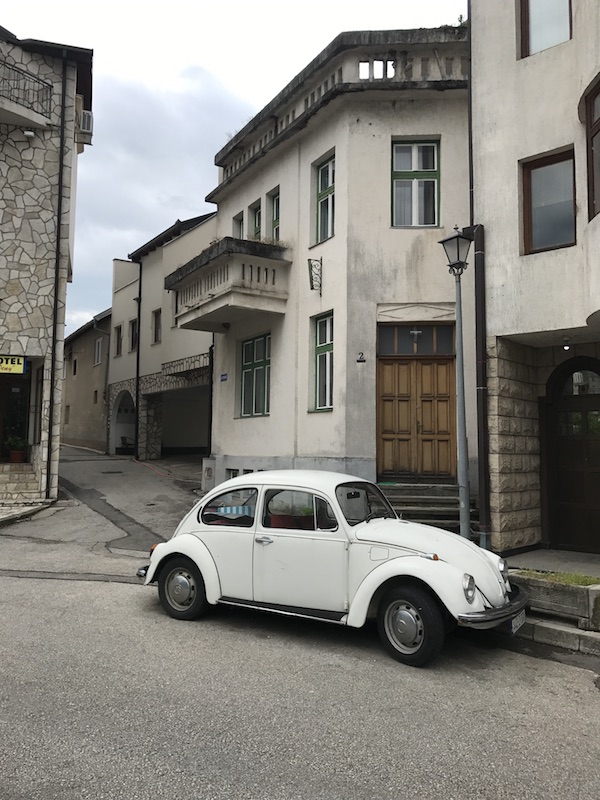
Sitting at the table, I felt as if Senka and I were old friends, though this was our first time meeting in person. For the last few months, we’d been working together by email on a publication series called The Borders Project for her online journal Strane. I’d co-led a Sarajevo-Atlanta literary collaboration by that name with eighteen writers, including myself, and six Bosnian photographers, and Mirza had translated the English texts into Bosnian/Croatian/Serbian so we could publish all the work with Senka. (We’d already done an English edition with the journal EuropeNow.) We were about a third of the way into the Strane series when we all met in Mostar for dinner.
Later that night, we sat around the coffee table in Senka’s high-ceilinged apartment, drinking red wine and joking with her teenage son, Ali, about procrastinating on a science project due the next day. They told us how the segregated school system works—certain hours allotted for one ethnic group, certain hours for another.
At some point, Senka presented me with a copy of her debut novel, Kintsugi Tijela, based on her experience of cancer, a slim book that, several months later, would win the Meša Selimović prize, one of the biggest awards for the novel in the region.
“I was already planning to buy it,” I told her, taking the book. “I’ll be a slow reader. I’ll have to look up every other word. But I can’t wait.”
“It will be easier for you to read than many books written in our language,” she assured me. “I wrote that novel in very short sentences.”
Before we went to bed—or was it the next morning?—I said to Senka, “I would love to collaborate with you here. I really like what we’re doing with Strane and The Borders Project, but I’d love to do something in Mostar—in person.”
“That would be great,” she said. “Unfortunately, these days it’s difficult to get people to come to literary events.”
I told her I was surprised. I’d heard so much from Mirza about the liveliness of Mostar’s arts scene. Then again, things change. Over the last few years, droves of young people looking for opportunities have left the country. Mirza, who is now forty, told me that at least fifty of his friends and acquaintances have moved abroad in recent times. Some of my friends, too—including writers from the Sarajevo group—have either relocated or considered it.
Perhaps Senka’s comment, along with this reality, caused me to think about a Mostar project with a greater sense of intention. I’d planned some interesting collaborative events with writers and artists in Boston. When Mirza and another Bosnian writer, Faruk Šehić, came over for a tour in 2018, we orchestrated an international reading in the front hall of my communal house, with guests sitting up the staircase and impromptu jamming afterward with musician friends.
That same year, I gave an interview to the Bosnian magazine Urban about the Sarajevo writers’ group, and the interviewer stated that it seemed shrewd for writers to connect and work together rather than wait for publishers to come around and take notice. I agreed. As artists, we can often create more nimbly outside of existing structures. Especially in our current time—when those structures have been hobbled by global crises, when governments continue to enflame or embrace nationalist agendas, when systemic racism undermines institutions—especially in this time, working together at the grassroots level to build artistic community across borders and establish platforms for those with stories to tell seems even more vital.
What if we do this or that, I heard myself suggesting to Senka as we stood in her kitchen. “Maybe we could generate some life through collaboration and encourage people.”
“Yes,” she agreed. “Let’s try it.”
*
While working on this essay, I’m reading War and Peace as part of a virtual book club started during the pandemic by the writer Yiyun Li and A Public Space. I read the book more than a decade ago; I recall writing my GRE essay on it, something about the way Tolstoy’s narrative inhabits the tension between the machinery of history, its seeming inevitable march forward, and the free will of individuals, though I may be conflating my ideas with those I heard on a BBC podcast. As I read the novel now, I find myself writing in the margins the phrase “the body.” I mean the way Tolstoy illuminates human character through swipes of physical detail. A gesture. The face. What we carry from inside to outside. Or, what makes its way from inside to outside. Ego. Beauty. Goodness. Hurt.
Sometime after my trip to Bosnia and Herzegovina, the Meša Selimović prize announced Senka’s novel as the winner, and Mirza began translating it without a publishing contract. When Mirza falls in love with a piece of literature, all he wants to do is translate it, perhaps as a way to get inside the language, as if to digest the words. And he works fast. During the fall, he sent me about thirty pages, and I too fell into Senka’s world. I’d started reading in the original language and now inhaled the English excerpt.
I wanted to learn. Listen. Encourage. Contribute. Have conversations. Build relationships. Open doors here for Mostar writers, if I could. In all—be involved in something loving.
Written in the second person—a self-address that also implicates the reader—Kintsugi Tijela, or Body Kintsugi in English, opens as the narrator’s husband packs and moves out: “He managed to pick up all three bags. Eyes cast down, hurrying down the stairs to the taxi that was already waiting for him in the street. After that you sat long in solitude in front of that bare wall and slowly realised that he hadn’t left behind a feeling of emptiness, only a sense of defeat.”
Then the narrator finds a lump in her breast. The writing is intimate—patient, sensory, murky—a portrait of consciousness under duress.
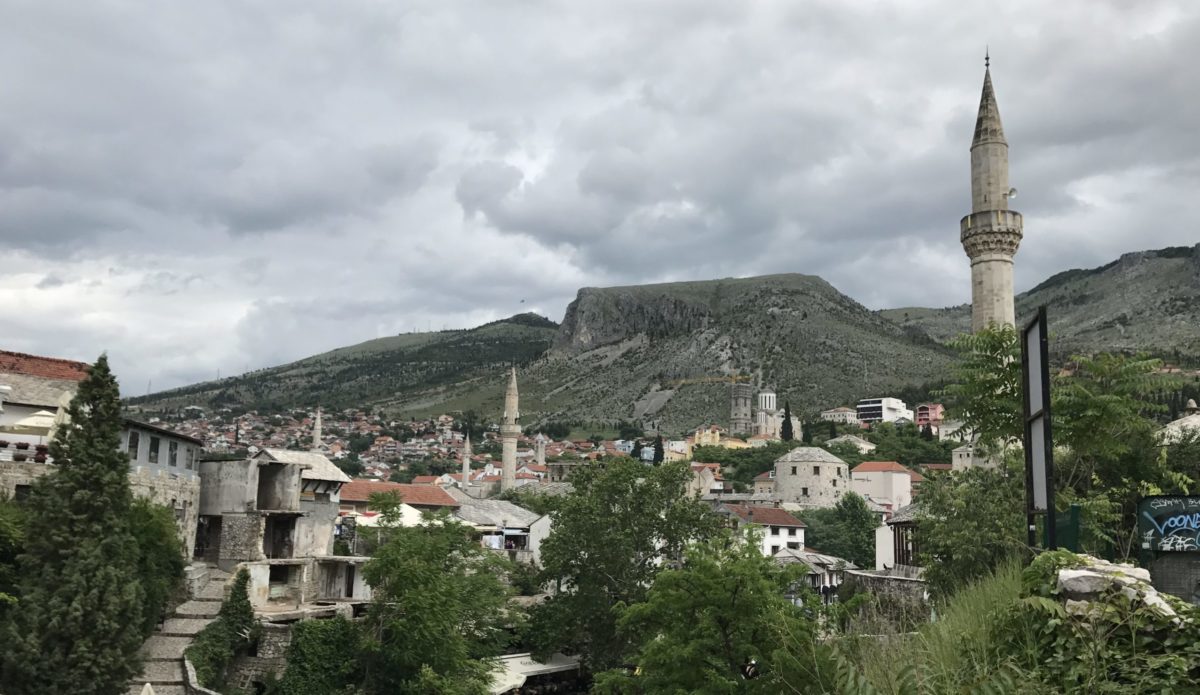
Around the same time, I began designing a research writing course at Boston University called Balkan Literature since the ’90s War, and I decided to include Mirza’s translated excerpt of Senka’s book. When I learned I was eligible to apply for faculty development funds, I immediately wrote to the two of them: Shall we plan our Mostar project—at Abrašević?
With their help, I put together a proposal for a weekend of writing workshops and events. We talked about integrating the wider Mostar arts community. Mirza spoke to his friend at Abrašević about creating an audio/video package.
But what was our vision for this particular collaboration? For my part, I knew I wanted to work with Senka, Mirza, Anita, and others—to connect with the city’s young writers and artists who didn’t subscribe to what the Neretva River, that natural border, seemed to enable or ensure: political division. I wanted to learn. Listen. Encourage. Contribute. Have conversations. Build relationships. Open doors here for Mostar writers, if I could. In all—be involved in something loving.
[Y]ou are right, Senka wrote to me later, the whole thing is about Love!
I got the funding, and we decided on mid-May of this year as our date.
Then: COVID-19.
In March, health care workers and patients at a hospital in Mostar were reportedly exposed to the virus. Curfews were instated across the country. One of the writers from the Sarajevo group told me the pandemic was triggering a wartime mentality. The difference, this friend said, is that in Sarajevo during the siege, no one had food, water, or electricity. Now people have those, but there’s nowhere—like Germany, for instance—to escape.
A virus doesn’t know borders.
Senka wrote, I think it is safe to say it is not likely May will happen, and we’ll probably have to postpone it… But let’s hope for the best.
*
In April, about a month into remote teaching at BU, Senka and Mirza joined my Balkan literature class on Zoom to discuss the translated novel excerpt. I saw their visit as a kind of warm-up for the Mostar project, assuming we’d be able to do it live in the future. A gig before the gig. A preliminary, quasi-public conversation. A way to connect with a different group of young people.
The day before the scheduled class, Senka texted me pictures of her balcony, which she’d just finished readying for spring. A shot of the long table and bench and the door leading into her kitchen, where I’d eaten breakfast just a year earlier. A view of the town—cloudless blue sky, bright sunshine, red-tile rooftops, trees aflame with green foliage, a minaret. I felt a sudden tightness in my stomach: I missed that place. I missed the past—what I’d felt while visiting. I felt my own personal losses acutely. I missed the future.
The next evening, my two guests appeared in the online grid of faces—it was 11 p.m. their time. Seeing them made me happy in a way I hadn’t felt in a while.
Seated on a couch in Sarajevo, wearing a now longer beard and spiky haircut, Mirza answered a student who wanted to know when the translation of Senka’s book would be finished.
“Sorry, guys,” Mirza replied. “Such is my life. I would prefer to be, you know, working on that book, but there are other things to do to pay the bills, so it’s going to have to be on the back burner for a while—for a month or so, and then I’m pressing on hopefully.”
Senka listened as students introduced themselves, looking on through round, horn-rimmed glasses, thanking each person, smiling. “Please bear with me,” she said, “because I just realized I think this is the first time I’m speaking about my novel in English.”
She told us that she’d drafted Kintsugi Tijela in a month and a half but had spent another year revising it. “[I was] working on the language and making the sentences shorter and more, like, precise and more straight to the point and kind of stronger in way as well. … I thought [the draft was] … too heavy and too demanding, and the theme itself is really demanding in an emotional way, so I just realized the sentences really need to be short and clear, straight to the point.”
The book follows the narrator’s experience of cancer from the time she discovers the lump in her breast but also includes moments from her childhood that seem to be dropped in along the path of the cancer narrative.
“I think that all the pain that we carry throughout the life,” Senka explained, “it starts in the childhood. So for me it was important to go to those different points in the life of the narrator and to try to find those, let’s call them, seeds of pain, and to think about how they affected this girl who’s about to become the woman who is losing the parts of her body.”
Mirza gave his translator’s perspective: “The really fascinating thing is you have these childhood bits and the cancer bits, and the language hardly seems to change … The building blocks are virtually the same.”
I considered the artistry in Senka’s work—the sentences like cords holding together the pieces of the story, ligaments holding pieces of the body, revealing the unity in a life, the connection between suffering in one part and its outworking in another. I reflected on the nuanced, long-term effects of emotional pain, of suffering in its range of forms and degrees, of trauma.
We spoke about how Senka, who’d managed to leave during the war, sees her work in relation to it. “If I were to joke,” she said, “I would say I’m probably too egoistic to think about anything but myself. But I think I’m mainly a poet … and I’m kind of generally in life really locked into my inside world. … And the other point is the war has ended twenty years ago, and I really, really want it to be over.”
Mirza smiled slyly when I asked him how he sees the war figuring into Balkan literature. He noted that a refugee family features in Senka’s novel, that the narrator seeks surgery in a different country. “Before the war that wouldn’t have been the case,” he said. “…[I]t’s always there in some way or other.”
Senka laughed, taking Mirza’s point.
I asked how her narrator copes with the experience of a life-threatening illness, an area of interest for my students.
Senka said, “Well, I think the whole story is actually about her trying to find those seeds of trauma in the childhood and become aware of them and the way they make her the woman she is today. … So she has to challenge herself in every way to go as deep into herself to find all those reasons and in the same time to fight the illness on the everyday basis … It does take a lot of courage … Here people say you have to fight it [cancer], you fight, … but on a personal level, the first thing I realize is I don’t have to fight … it’s in me, it’s part of me. … [T]he only thing I have to fight is fear. So that’s the only fight, to keep the fear away, and that’s something that takes like twenty-four hours a day of your energy. And once you start winning that battle, … you can feel centered … in an eye of a storm in a way … because if we try to find the peace outside, it’s never going to happen.”
Senka spoke with increasing conviction, as if she were exhorting us personally. About now. About the way we’re living in this time.
How are we going to cope with the tectonic shifts in our world—shifts that, many weeks after this meeting, came to include not just a global pandemic and economic collapse, but the murder of George Floyd by police in the US and a massive protest movement.
Of the pandemic, Senka said, “Even now, [if] we just keep reading the news and listening to the stories, what people say, we’re just going to go crazy. The answer is not out there, the only answer is inside of us. Of course, we’re not going to know when this thing is going to end, … but we will know that we’re alive if we keep reading and if we understand where our control begins and where it ends and how much we can know and how much we can’t know. So to me that’s like the main mechanism of coping for me personally and that’s something I wrote in the novel as well. Finding your inner center, your inner peace….”
*
As of this writing, I’ve been living for months under a stay-at-home advisory in my communal house in the Boston area. Now the country has started to open up. The protest movement is just weeks old. I’m not sleeping well. I wake at all hours with a complex sense of urgency, concern for my parents’ health, panic as I can’t get to them in Atlanta and South Carolina, worry for people’s safety.
On Day 25 of the War and Peace book club, A Public Space tweeted out a quote from Joshua Rothman, who interviewed Yiyun Li on the New Yorker Radio Hour. In Tolstoy’s book, Rothman says, “Even though the war is happening, people still are falling in love, they’re singing songs, they’re living in nature.”
They’re struggling.
I’ve corresponded with Senka and Mirza throughout the pandemic. At some point, Senka wrote that she was able to get her college-age daughter back to Mostar from Vienna—so at least that gives me peace. Mirza’s father, a doctor in Bihać, was exposed to the virus and quarantined himself. Mirza’s message at the time: Worried sick if I’m honest Other than that fine?
These days, the three of us have been brainstorming about how to create another kind of Mostar collaboration—or, a more elaborate gig before the gig. We can’t yet be together with our bodies in Mostar—in Abrašević. We won’t have chance encounters with Mirza’s friends. Or give in-person interviews at the center’s radio station. We won’t stop for nuts on the pedestrian mall or kafa s mlijekom or gaze at the blue-green Neretva. But we can still deepen our relationships, support the Mostar arts community, learn from each other, love, and make ways for voices to be heard.
Stacy Mattingly
Stacy Mattingly is a writer living in the Boston area. She was a 2024-25 Fulbright U.S. Scholar to Bosnia and Herzegovina, where she has collaborated with writers for more than a decade. She teaches at Boston University and Berklee College of Music and has led workshops for the Elizabeth Kostova Foundation and the International Writing Program. Her recently completed novel manuscript is set in present-day Sarajevo.









